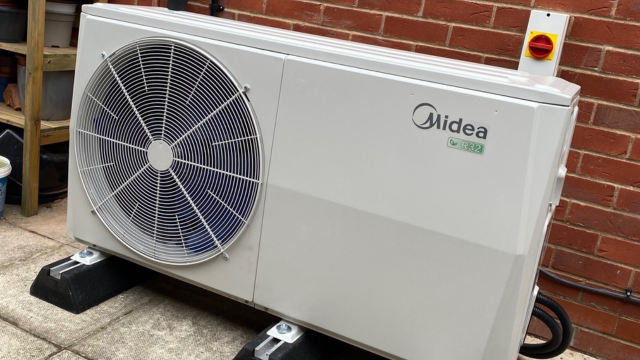5 Benefits of Air Pump Heating
Introduction to Air Pump Heating
What is Air Pump Heating?
Air pump heating, also known as air source heat pumps (ASHP), is a sustainable heating system that extracts heat from the outside air and transfers it indoors to provide warmth during colder months. Unlike traditional heating methods that rely on burning fossil fuels, air pump heating utilises renewable energy sources, making it an environmentally friendly option for both residential and commercial properties.
How Does Air Pump Heating Work?
The operation of an ASHP involves the use of a compressor and refrigerant to absorb heat from the outdoor air, even in chilly temperatures, and then release it indoors through a heat exchanger. This process is highly efficient and can provide consistent heating throughout the year, regardless of the external weather conditions.
1. Energy Efficiency
Reduced Energy Consumption
One of the primary benefits of ASHPs are their exceptional energy efficiency. By harnessing the latent heat present in the ambient air, these systems can generate up to three times more energy than they consume, resulting in significant reductions in energy bills compared to conventional heating methods.
Environmental Impact
In addition to lower energy consumption, air pump heating systems also have a minimal environmental footprint. By utilising renewable energy sources and emitting fewer greenhouse gases, they contribute to combating climate change and promoting sustainability in heating practices.
2. Cost Savings
Initial Installation Costs
Although the initial investment in air pump heating systems may be higher than traditional heating systems, the long-term cost savings outweigh the upfront expenses. With government incentives and subsidies available for renewable energy installations, homeowners can offset the initial costs and enjoy greater savings over the system’s lifespan.
Long-term Savings
Furthermore, air-source heat pumps offer long-term savings through reduced energy bills and lower maintenance requirements. With fewer mechanical components and minimal wear and tear, these systems can operate efficiently for many years, providing reliable heating without the need for frequent repairs or replacements.
3. Comfort and Convenience
Consistent Temperature Control
ASHPs provide consistent and even heating throughout indoor spaces, eliminating cold spots and fluctuations in temperature. This ensures optimum comfort for occupants, allowing them to maintain a pleasant living or working environment without the need for additional heating sources.
Customisable Heating Zones
Moreover, ASHPs offer the flexibility to create customisable heating zones within a property, allowing users to adjust the temperature settings according to their preferences and occupancy patterns. This zoning capability enhances comfort and energy efficiency by optimising heating distribution based on specific usage requirements.
4. Health and Air Quality
Reduced Allergens and Dust
Unlike traditional heating systems that rely on forced air circulation, ASHPs do not recirculate indoor air, reducing the spread of allergens, dust, and pollutants. This results in improved indoor air quality and a healthier living environment for occupants, particularly those with respiratory conditions or allergies.
Humidity Regulation
Air pump heating systems also contribute to maintaining optimal humidity levels indoors, preventing the build-up of excess moisture or dry air that can lead to discomfort and respiratory issues. By regulating humidity levels, these systems promote a more comfortable and healthy indoor environment for occupants throughout the year.
5. Versatility and Adaptability
Compatibility with Various Architectural Styles
ASHPs are versatile and adaptable, making them suitable for a wide range of architectural styles and building configurations. Whether installed in new construction or retrofitted into existing properties, these systems can seamlessly integrate with different heating distribution systems and architectural designs.
Suitable for Different Climate Conditions
Another advantage of air pump heating systems is their suitability for different climate conditions, including colder climates where temperatures frequently drop below freezing. With advanced technology and defrosting capabilities, these systems can maintain efficient operation even in extreme weather conditions, ensuring reliable heating performance year-round.
Summary of Benefits
In conclusion, ASHPs offer numerous benefits, including energy efficiency, cost savings, comfort, and improved indoor air quality. By harnessing renewable energy sources and providing consistent heating performance, these systems represent a sustainable and practical solution for residential and commercial heating needs.
Considerations Before Installing Air Pump Heating
Before investing in an ASHP system, it’s essential to consider factors such as property size, insulation levels, and climate conditions to ensure optimal performance and efficiency. Additionally, consulting with a qualified HVAC professional can help determine the suitability of air pump heating for specific heating requirements and budget considerations.
By embracing air pump heating technology, homeowners and businesses can enjoy the advantages of sustainable heating while reducing their carbon footprint and energy costs for years to come.
Contact Radiant Renewables Today
If you’re considering upgrading your heating system to a more efficient and environmentally friendly option, contact Radiant Renewables today. Our team of experts can provide personalised consultations and help you explore the benefits of air pump heating for your property.
From initial assessment to installation and ongoing maintenance, we’re committed to delivering reliable and sustainable heating solutions tailored to your needs. Don’t wait any longer to experience the comfort, cost savings, and environmental benefits of air pump heating. Get in touch with Radiant Renewables and make the switch to a greener future today!
By embracing air pump heating technology, homeowners and businesses can enjoy the advantages of sustainable heating while reducing their carbon footprint and energy costs for years to come.
